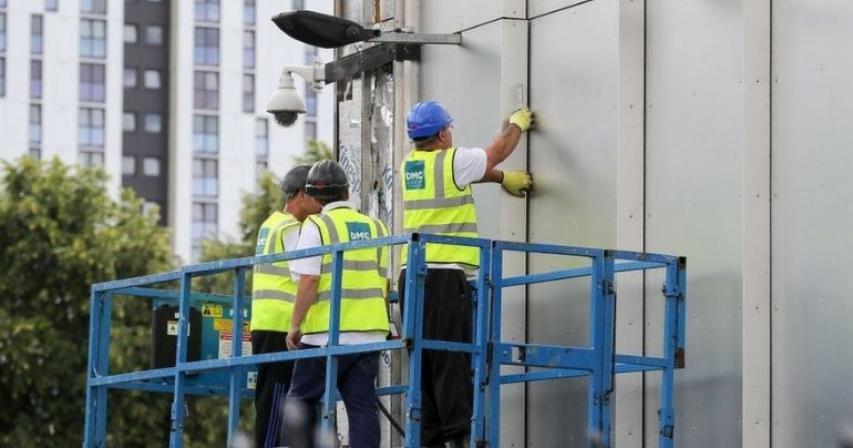Homeowners to get 15 years to sue for bad workmanship - minister
- 4 years ago

Homeowners will get 15 years in which to legally challenge shoddy building work in light of the cladding crisis, a minister has said.
This would increase the current six-year period in which legal action can be brought against developers.
Housing Secretary Robert Jenrick said the change would "put new cards in the hands of the leaseholders".
It comes amid concerns that homeowners are bearing the cost of fire safety works following the Grenfell tragedy.
Labour said the announcement would bring "little relief" as the barriers to mount legal action were "too high and costly".
After the 2017 fire in which 72 people lost their lives, thousands of other blocks of flats were found to be covered in similar dangerous cladding.
This triggered a programme of works to remove the material from buildings, as well as other fire safety improvements, leaving many residents with huge bills.
Speaking to the BBC's Andrew Marr programme, Mr Jenrick said "it is not right that either the leaseholder or the taxpayer" should pay for fire safety changes.
"I'm announcing today we are going to change the law retrospectively to give every homeowner 15 years in which to take action against the people who built their building if there is shoddy workmanship.
"This is a huge step forward - the law as we found it was that you only had six years to take action against the person who built your home.
"That often gives you less protection than if you had bought a toaster or a fridge."
Asked about buildings more than 15 years old, Mr Jenrick said "most of the cladded buildings were built in the period from 2000-17".
He said "not all, but the lions' share that are facing this particular issue will now be helped by this unusual change in the law".
'Terrifying'
Leaseholder Rachael Teebay, who bought her first home together with her partner in Manchester, faces huge bills to pay for building works.
Speaking to the BBC in April, she said: "I have spent days and weeks crying about it and worrying about our future."
"Declaring bankruptcy at this age, what does that do for our future? It decimates it. It's terrifying."
Labour's shadow housing secretary Lucy Powell said the government's announcement would "bring little relief to homeowners trapped in unsellable, unmortgagable homes, as those already in the scope of the deadline have found barriers to mount legal action too high and costly, and outcomes ineffective".
Instead she said leaseholders should be legally protected from costs and a building works agency should be set up to "pursue developers themselves, to ensure the polluter pays".
The government has comes under increasing pressure to provide more support for homeowners facing high costs.
A large number of its own MPs voted against the government on the Fire Safety Bill in a failed bid to introduce stronger financial protections for leaseholders.
Mr Jenrick said he had "huge sympathy" for people in this situation adding that, except for a few cases, all Grenfell-style cladding would be removed from buildings by the end of the year.
In February, the government set aside £3.5bn to replace unsafe cladding for residential buildings 18m (six storeys) or higher in England.
This was on top of £1.6bn announced in 2020 for the removal of unsafe cladding.
For buildings under 18m, residents can access a loan to help pay for removal, towards which they pay a maximum of £50 a month.
However, campaigners have argued that many leaseholders are also facing bills to pay for other safety measures such as fire breaks, safer doors and sprinkler systems.
Source: BBC
Comments